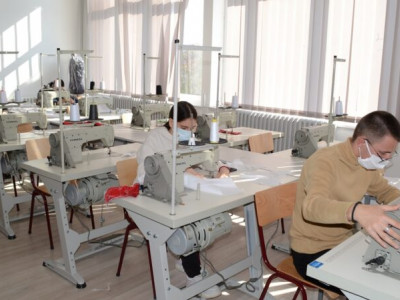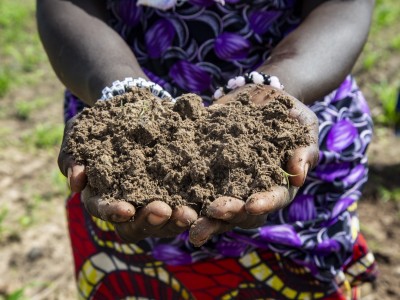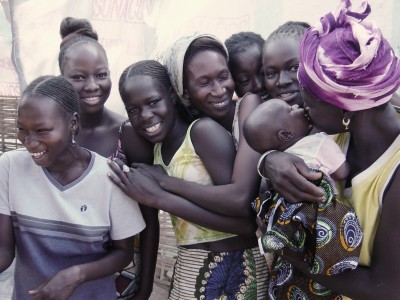Socio-Economic Opportunities for Youth and Women's Empowerment and Social Cohesion in the Center-North Region of Burkina Faso
IOM: Chrisla Joseph (chjoseph@iom.int)
UNDP: Aboubacar Oualy (aboubacar.oualy@undp.org)
Objetivos de Desarrollo Sostenible Relacionados y Objetivos del Pacto Mundial sobre Migración
Resumen
The socioeconomic situation of refugees and internally displaced people (IDPs), especially that of women and youth in Burkina Faso, was severely impacted by the COVID-19 pandemic. At the same time, the health crisis was compounded by conflict and instability. The rise in incidents of armed violence has also led to a humanitarian crisis, displacing 1.5 million people. The rapid deterioration of the situation has created a disruption in access to basic social services in conflict-affected communities. Consequently, the increasing competition for resources has fueled intercommunal tensions and undermined the population’s existing resiliency mechanisms and social safeguards.
While the Government of Burkina Faso was making significant efforts to resolve the crisis, the number of people in need of assistance continued to grow, especially those in already vulnerable situations, such as refugees and IDPs. This joint action aimed to support local communities to provide sustainable livelihoods opportunities for women and youth, thereby reducing poverty and strengthening communities in the wake of the combined health and conflict crises.
Objetivo clave
As part of the overall UN support to the COVID-19 National Response Plan and efforts toward smooth recovery, this IOM and UNDP Joint Action partnered with the National Observatory for the Prevention and Management of Community Conflicts (ONAPREGECC) and aimed to improve socio-economic opportunities for young women through employment and entrepreneurship initiatives. At the same time, this initiative reinforced the role of local authorities in strengthening social cohesion between and improving the resilience of displaced and host communities in the Centre-North region of Burkina Faso.
Principales actividades
In partnership with ONAPREGRECC, IOM and UNDP conducted the following activities:
-
Supported awareness-raising sessions targeting affected communities in the Center-North region (Kaya) to make them aware of the ONAPREGECC mandate and available support, and to disseminate best practices to avoid and prevent conflict and promote social cohesion. In addition, the knowledge and capacities of a network of local journalists were strengthened in order to empower them to serve as an early warning network to inform on the risk of potential conflicts and promote conflict prevention.
-
Built the capacities of targeted community members in the Center North region to empower them to undertake social cohesion activities with other members of their communities, including IDPs. During this activity, members from different cultural backgrounds prepared and shared traditional meals and organized recreational activities. This cultural activity also benefited from the support of the community leaders and local authorities, with the strong involvement of women and youth.
-
Supported the empowerment of and improved resilience-building for young women living in vulnerable communities of the Center-North through small grants to help them develop and implement income-generating activities. Through this activity, 60 internally displaced women have enhanced their technical skills and improved their economic resilience thanks to hands-on training delivered on horticulture and production methods and the subsequent provision of a small toolkit to sustain future horticulture practice.
Éxitos clave o factores innovadores, buenas prácticas y lecciones aprendidas (si están disponibles)
The partnership between IOM and UNDP provided the two agencies with opportunities to explore new areas of collaboration where they can bring together their expertise and better address communities' needs. The income-generating activities, better access to farming methods and provision of equipment has provided the most vulnerable communities with the tools to help them address COVID-19's impacts and build back. Beyond this Joint Action, IOM and UNDP aim to further empower vulnerable groups, in particular IDPs and migrants, by promoting a rights-based approach centered on human agency and human development, and the two agencies continue to foster their partnership.
A joint approach such as this one is integral to achieve the SDGs, more specifically SDG 1 on no poverty, SDG 2 on zero hunger, SDG 5 on gender equality, SDG 8 on decent work and economic growth, SDG 10 on reduced inequalities, SDG 16 on life on land and SDG 17 on partnership. It also contributes to the achievement of the GCM objectives such as GCM objective 6 on facilitating fair and ethical recruitment, safeguarding conditions that ensure decent work, GCM objective 7 addressing and reducing vulnerabilities, GCM objective 16 on empowering migrants and societies to realize full inclusion and social cohesion and GCM objective 18 investing in skills development and facilitate mutual recognition of skills, qualifications and competences.
Beneficiarios
Young women, IDPs, host communities, conflict-affected communities, local journalists


